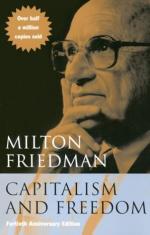|
This section contains 794 words (approx. 2 pages at 400 words per page) |

|
Chapter 9, Occupational Licensure Summary and Analysis
Freedom of occupation has been a key factor in the dramatic increase in wealth and freedom in the 19th and 20th centuries, but we have engaged in a regression by letting the state issue occupational licenses. In this chapter Friedman argues against licensure in general and medical licensure in particular, in part to show that liberal principles can have seemingly radical conclusions.
Licenses are simply restrictions on who may hire who. Guilds and castes are related systems. In fact, all restrictions on trade are restrictions on the arrangements some came make on others. Today occupational licensure is spread across the economy and the arguments for control of labor supply are typically given by those who benefit from the licenses.
In fact, licensed practitioners benefit from licensure because they are able to raise their wages by reducing the...
(read more from the Chapter 9, Occupational Licensure Summary)
|
This section contains 794 words (approx. 2 pages at 400 words per page) |

|




